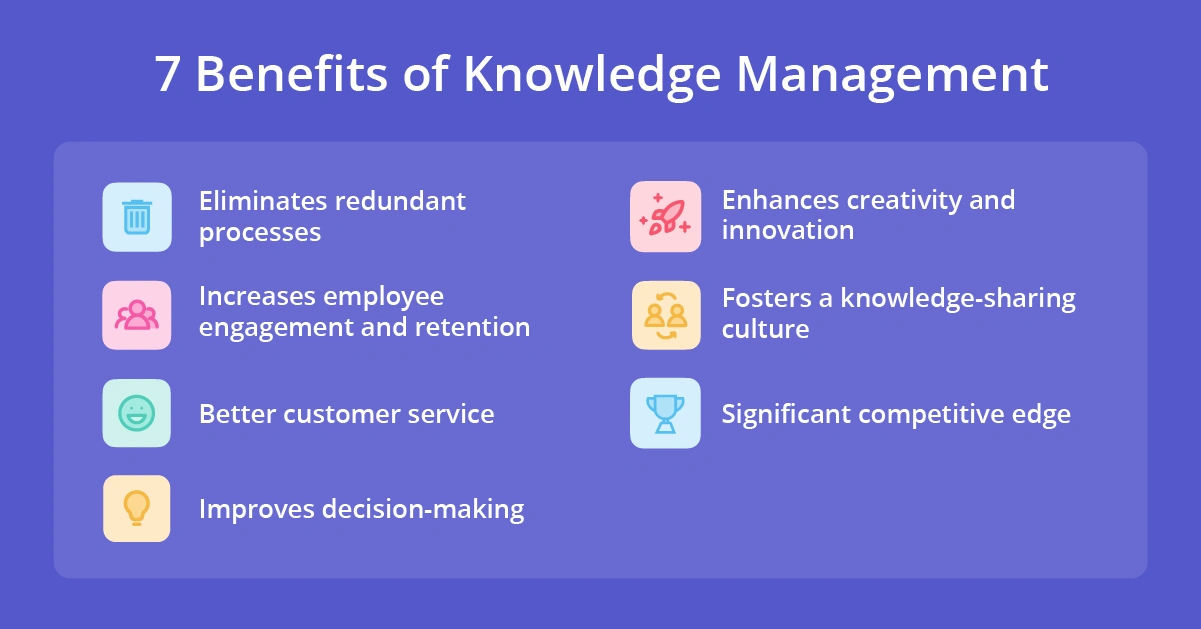Knowledge management is an organization's joint effort to collect, store, disseminate, and utilize knowledge. This notion is vital in contemporary business practices as an imperative tool for competitive differentiation and sustained growth since companies that have effective knowledge management can increase their productivity by at least 20%.
What is knowledge management?
Knowledge management is the systematic process of capturing, developing, sharing, and efficiently utilizing organizational collective intelligence or knowledge. It involves a multifaceted interaction between people, processes, and technology and it transcends across all departments.
The function of knowledge management drills down to creating, sharing, using, and managing the knowledge of individuals within an organization. Its relevance stems from its ability to foster an environment where knowledge is continuously being created, discovered, captured, shared, distilled, validated, transferred, adopted, adapted, and applied.
There exist two types of knowledge management systems: the tacit knowledge management system and the explicit knowledge management system. Understanding these types of knowledge management systems is integral to realizing the immense value hidden in the knowledge assets of any organization.
Tacit Knowledge
Tacit knowledge management pertains to the unrecorded, personal expertise in the minds of employees.
Explicit Knowledge
Explicit knowledge management relates to the recorded knowledge that can be disseminated within an organization.
Why is knowledge management important?
Fortune 500 businesses lose a combined $31.5 billion per year from employee's inability to share knowledge effectively, which is why understanding the importance of knowledge management is critical in the evolving landscape of modern enterprises, from financial services organizations to retail businesses.
Knowledge management is the strategic process of capturing, managing, and effectively utilizing the collective know-how of an organization’s workforce. It is employed to increase efficiency, innovation, and competitiveness.
With 81% of employees frustrated by not being able to access knowledge and spending an average of 1.8 hours per day searching and gathering information, implementing effective knowledge management becomes critical for businesses to improve operations and guide larger organizational strategies. Companies seeking a smart, competitive edge must consider investing in knowledge management, amplifying their benefits to everyone involved.
Top benefits of knowledge management
Delving into the key benefits of knowledge management, it becomes apparent that it holds the potential to overhaul an organization’s operational efficiency, competitiveness, and growth trajectory.

1. Eliminates redundant processes
By effectively capturing, organizing, and disseminating knowledge, companies can streamline their operations and ensure that employees have access to the most up-to-date and relevant information. This, in turn, reduces the need for repetitive tasks and minimizes inefficiencies that often arise from duplicated efforts.
Knowledge management enables employees to easily access established procedures, best practices, and lessons learned, allowing for a more cohesive and standardized approach to tasks. Through the elimination of redundant processes, for example through knowledge management automation, organizations can enhance overall efficiency, cut down on wasted time and resources, and contribute to improved productivity and competitiveness in the dynamic business landscape.
2. Increases employee engagement and retention
A well-implemented knowledge management system results in increased employee satisfaction and retention, leading to better collaboration and communication within teams. By fostering a culture of learning and growth, it helps to equip employees with the right knowledge and skills to perform their roles more effectively.
Attrition can also be mitigated by a strong knowledge management system. The loss of organizational knowledge due to staff turnover can be curtailed by systematically capturing and transferring knowledge.
3. Better customer service
Enhanced customer service can be achieved through the successful application of knowledge management. Frontline staff equipped with reliable, up-to-date information can provide superior service to customers, thereby bolstering customer satisfaction and loyalty.
By leveraging structured knowledge, frontline employees can provide quick, accurate responses to customer queries, improving the overall customer experience, a crucial metric in today's experience-driven marketplace. They also lead to better resource utilization, as redundant efforts and duplication are eliminated, making operations more cost-effective.
4. Improves decision-making
Collecting, organizing, and applying knowledge effectively holds numerous benefits for businesses. A knowledge management system can streamline the decision-making process and enable organizations to make quicker and more informed decisions by providing employees with better access to relevant, accurate, and up-to-date information.
Refined, high-quality knowledge allows businesses to make informed, tactical choices. Accordingly, with a solid knowledge governance strategy and framework, companies can significantly mitigate business risks, making knowledge management systems a vital tool for strategic business decisions.
5. Enhances creativity and innovation
An effective knowledge management strategy can lead to a snowball effect of innovation. By providing a platform where ideas can be shared and built upon, an organization can spur creativity and contribute significantly to product or service enhancements.
A well-structured repository of knowledge equips employees with a wealth of ideas and insights, providing fertile ground for fresh, ingenious solutions to business challenges. Ultimately, the ability to effectively manage and distribute knowledge spurs creativity and innovation, giving businesses a competitive edge.
6. Fosters a knowledge-sharing culture
Another facet where knowledge management proves beneficial is fostering collaboration amongst employees. A platform where ideas can be freely shared and discussed progresses ideas, fostering a more collaborative work environment. By stimulating the sharing and utilization of new ideas , it facilitates a culture of continuous learning and creativity.
With a knowledge management system, businesses can seamlessly transition between employees, ensuring pivotal corporate knowledge is not lost. Additionally, it can result in effective collaboration across departments, resulting in a more cohesive organization. A knowledge management system bridges the knowledge gap between varied business domains, promoting cross-functional knowledge exchange.
7. Significant competitive edge
Fostering organizational agility is paramount. In an era of unprecedented change, agility in responding to market shifts is a competitive differentiator, and effective knowledge management can provide the adaptability needed.
Knowledge management systems facilitate the organization of information, ensuring relevant material is accessible when needed. This aids in quick decision-making and constructive problem-solving, vastly improving organizational efficiency.
Additionally, knowledge management can spawn new business opportunities by identifying areas of expertise and lead to cost savings. By averting the need to reinvent the wheel through duplicative work, the organization can realize substantial savings in time and resources.
How knowledge management benefits your business
The benefits of knowledge management extend not just to the operational facets of business but also contribute toward building an organization's resilience, fostering a learning culture, and enhancing its competitive edge in the market.
Visit our features page to learn more about how the strategic implementation of knowledge management truly stands as a catalyst for sustainability and business growth.



